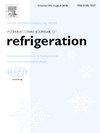Dynamic synergy optimization (DSO): An integrated approach of metaheuristic algorithms and PID control for real-time stability enhancement in refrigeration systems
IF 3.5
2区 工程技术
Q1 ENGINEERING, MECHANICAL
International Journal of Refrigeration-revue Internationale Du Froid
Pub Date : 2025-02-13
DOI:10.1016/j.ijrefrig.2025.02.015
引用次数: 0
Abstract
With increasing global energy demand, improving the efficiency of refrigeration systems and reducing their environmental impact is crucial, especially since refrigeration often accounts for a significant portion of energy consumption. Traditional Proportional-Integral-Derivative (PID) control methods struggle with the complex, nonlinear nature of refrigeration systems, resulting in slow response times and limited optimization capabilities. While metaheuristic algorithms can perform global searches, they often lack the real-time fine-tuning necessary for optimal dynamic control. This study introduces Dynamic Synergy Optimization (DSO), a novel framework that integrates metaheuristic algorithms with PID control. Unlike conventional methods that only turn PID parameters using metaheuristics, DSO combines the global optimization power of metaheuristics with the real-time adjustment capabilities of PID, providing effective global search and local refinement. The PID controller ensures quick adaptation and system stability. Experimental results show that the Harris Hawks Optimization algorithm integrated with PID control outperforms standard PID control with a 63.3 % reduction in response time, a 69.2 % decrease in stabilization time, and a 19.65 % enhancement in energy efficiency. The DSO strategy significantly enhances the dynamic response and stability of refrigeration systems, reduces hysteresis, and accelerates the attainment of steady-state operation.
动态协同优化(DSO):基于元启发式算法和PID控制的制冷系统实时稳定性增强集成方法
随着全球能源需求的增加,提高制冷系统的效率并减少其对环境的影响至关重要,特别是因为制冷通常占能源消耗的很大一部分。传统的比例-积分-导数(PID)控制方法与制冷系统的复杂、非线性特性作斗争,导致响应时间慢,优化能力有限。虽然元启发式算法可以执行全局搜索,但它们通常缺乏最优动态控制所需的实时微调。本研究介绍动态协同优化(DSO),一种整合元启发式算法与PID控制的新框架。与传统方法仅使用元启发式方法来改变PID参数不同,DSO将元启发式的全局优化能力与PID的实时调整能力相结合,提供了有效的全局搜索和局部优化。PID控制器保证了系统的快速自适应和稳定性。实验结果表明,结合PID控制的Harris Hawks优化算法的响应时间缩短了63.3%,稳定时间缩短了69.2%,能效提高了19.65%,优于标准PID控制。DSO策略显著提高了制冷系统的动态响应和稳定性,减小了滞回,加速了制冷系统的稳态运行。
本文章由计算机程序翻译,如有差异,请以英文原文为准。
求助全文
约1分钟内获得全文
求助全文
来源期刊
CiteScore
7.30
自引率
12.80%
发文量
363
审稿时长
3.7 months
期刊介绍:
The International Journal of Refrigeration is published for the International Institute of Refrigeration (IIR) by Elsevier. It is essential reading for all those wishing to keep abreast of research and industrial news in refrigeration, air conditioning and associated fields. This is particularly important in these times of rapid introduction of alternative refrigerants and the emergence of new technology. The journal has published special issues on alternative refrigerants and novel topics in the field of boiling, condensation, heat pumps, food refrigeration, carbon dioxide, ammonia, hydrocarbons, magnetic refrigeration at room temperature, sorptive cooling, phase change materials and slurries, ejector technology, compressors, and solar cooling.
As well as original research papers the International Journal of Refrigeration also includes review articles, papers presented at IIR conferences, short reports and letters describing preliminary results and experimental details, and letters to the Editor on recent areas of discussion and controversy. Other features include forthcoming events, conference reports and book reviews.
Papers are published in either English or French with the IIR news section in both languages.

 求助内容:
求助内容: 应助结果提醒方式:
应助结果提醒方式:


